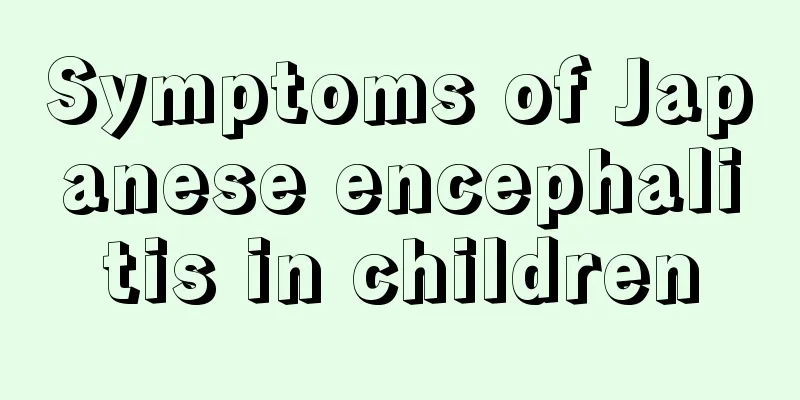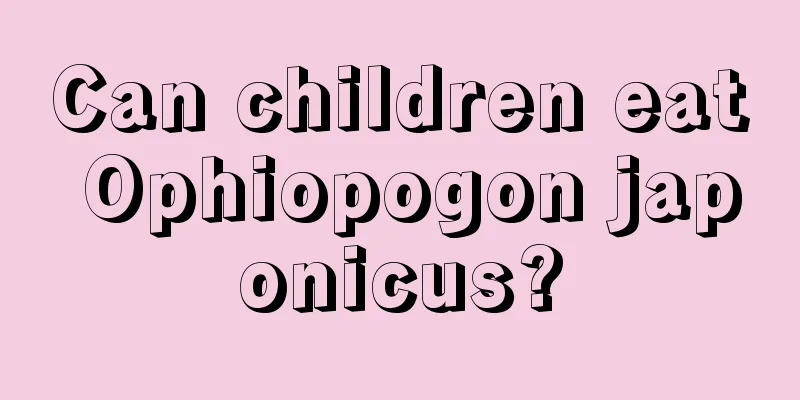Symptoms of Japanese encephalitis in children

|
In clinical medicine, there are many diseases that are contagious to a certain extent, and Japanese encephalitis is one of them. Japanese encephalitis is very harmful to the human body. The main symptoms are high fever, vomiting, drowsiness, etc. In general, patients with Japanese encephalitis are infected. Currently, the main source of infection of Japanese encephalitis is pigs, and mosquito bites may also cause Japanese encephalitis infection. The following article will introduce the symptoms of Japanese encephalitis in detail, and I hope everyone will pay attention to it. What are the symptoms of Japanese encephalitis? It usually takes 10-14 days from infection to onset of Japanese encephalitis, and the main symptoms are high fever, accompanied by headache, vomiting, drowsiness, neck stiffness and other symptoms of meningeal irritation. Severe cases may cause convulsions, coma, and even respiratory failure and death. The initial symptoms of Japanese encephalitis are very similar to those of upper respiratory tract infection, with fever, vomiting, nausea, and general discomfort. Therefore, it is recommended that if you have similar symptoms, you should get early diagnosis and treatment. Sources and routes of transmission of Japanese encephalitis The source of infection of Japanese encephalitis is infected humans or animals, and it is transmitted through mosquito bites. Pigs are the main source of infection of Japanese encephalitis. When mosquitoes first bite sick pigs and then bite humans, it can cause an epidemic of Japanese encephalitis in humans. Preventive measures for Japanese encephalitis 1. Get vaccinated against Japanese encephalitis. my country has included Japanese encephalitis vaccine in its child immunization program, and children aged 8 months and 2 years are given the Japanese encephalitis vaccine once each. 2. Clean up dead corners and stagnant water, unclog sewers, spray disinfectants and insecticides, eliminate mosquito breeding grounds, reduce mosquito density, and cut off transmission routes to prevent the occurrence and spread of Japanese encephalitis. 3. Kill and prevent mosquitoes. Kill mosquitoes, use screen doors, screen windows, mosquito nets, etc. to prevent mosquito bites, and encourage people not to sleep outdoors. Avoid mosquito bites when engaging in outdoor activities at dusk. In rural areas, the focus is on eliminating mosquitoes in livestock sheds (especially pig pens). What is Japanese encephalitis Japanese encephalitis, abbreviated as JE, is an acute infectious disease of the central nervous system caused by the Japanese encephalitis virus. It is a Class B infectious disease as defined in the "Law of the People's Republic of China on the Prevention and Control of Infectious Diseases". The disease is transmitted by mosquitoes and other blood-sucking insects. It is prevalent in summer and autumn, with peak incidence in July, August and September. It mostly occurs in children and is clinically characterized by high fever, impaired consciousness, convulsions, respiratory failure and meningeal irritation signs. Some children have sequelae. How does Japanese encephalitis occur? Japanese encephalitis is a natural epidemic disease, and the main source of infection is animals infected with the Japanese encephalitis virus, including livestock, poultry and birds. Pigs have the highest natural infection rate and are the main source of infection. After mosquitoes are infected, the virus multiplies in the mosquito's body and can carry the virus for life. The virus usually spreads among livestock first, and the mosquito-pig-mosquito cycle causes a large number of mosquitoes to carry the virus, playing an important role in the spread of Japanese encephalitis in humans. Children are a susceptible group, especially those under 10 years old, especially those aged 2-6 years old. What are the symptoms of Japanese encephalitis? The incubation period of this disease is 4-21 days, mostly 10-14 days. The main clinical manifestations are symptoms of meningeal irritation such as sudden high fever, headache, nausea, vomiting, drowsiness, and neck stiffness. Severely ill children may show convulsions, coma, and even respiratory failure. This is the most serious clinical manifestation of Japanese encephalitis and the main cause of death. Some children suffer from serious sequelae such as neuropsychiatric symptoms, aphasia, dementia, and paralysis. How to prevent Japanese encephalitis? Vaccination and mosquito control and prevention are the most effective control measures. 1. It is important to get vaccinated against Japanese encephalitis! Children under 10 years old are a susceptible group. The first vaccination target is 8-month-old infants. April to June each year is the season for Japanese encephalitis vaccination. Don’t miss the opportunity! 2. 1-2 months before the epidemic season of Japanese encephalitis, clean up sanitary dead corners, unclog sewers, spray disinfectants and insecticides, eliminate mosquito breeding grounds, implement mosquito prevention and control measures, and cut off the transmission routes as much as possible. 3. Improve the pigpen environment and sanitation, do a good job in mosquito control, and immunize livestock with live attenuated Japanese encephalitis vaccine to control the source of infection. Finally, parents need to be reminded: The early symptoms of epidemic encephalitis B are similar to those of upper respiratory tract infection, including fever, nausea, vomiting, and general discomfort. Therefore, it is recommended that everyone seek medical treatment in a regular hospital in a timely manner for early detection, early diagnosis, and early treatment! I wish the babies a healthy and happy childhood! |
<<: Why does my child always feel dizzy?
Recommend
How to treat scrotal effusion in children
Many children have problems with genital diseases...
Symptoms of navel infection in newborns
Newborns have to rely on their own bodies to resi...
Is the cause of facial eczema in children complicated?
Facial eczema in children is a facial skin diseas...
What is the cause of the baby's heart noise?
If a child has this kind of heart noise, it may c...
What to do if your one-year-old baby has a white tongue coating
The color of the tongue coating has a great relat...
What are the dangers of phimosis in children?
Phimosis can cause great harm to male friends, be...
How to take care of acne on the face of a full-month-old baby
Newborns have to face some processes after birth,...
How to disinfect and care for the navel of a newborn
The fetus is in the mother's womb, connected ...
What are the physical cooling methods for children?
Most children nowadays are only children. Once th...
How many months does the baby learn to play?
Many parents have strong doubts about how many mo...
What are the consequences of not getting vaccinated?
Generally speaking, newborns need to go to the ho...
Is 372 degrees considered a fever for a child?
It is very common for children to catch a cold an...
What are the nursing methods for premature infant convulsions?
With the influence of adverse social factors, mat...
What should I do if a child's foreskin and glans are adhered?
Phimosis refers to the situation where the glans ...
Treatment of thick white tongue coating in two-month-old baby
A two-month-old baby has a thick white tongue coa...









